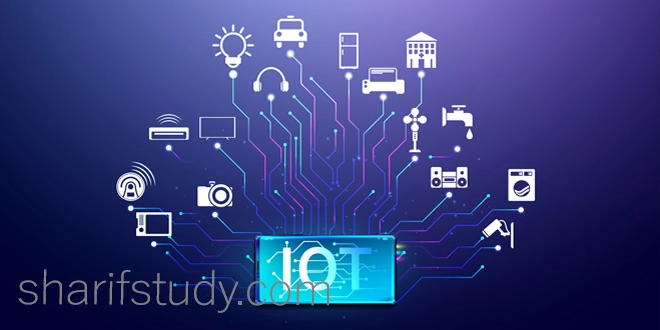APU BSc of IT in IoT refers to the network of physical items (“things”) uses sensors, software, and other technologies to connect and exchange data with other devices and systems through the internet.
These gadgets vary from simple domestic items to complex industrial equipment.
Today, there are more than 7 billion Internet of Things (IoT) devices, and analysts anticipate this figure to increase to 10 billion by 2020 and 22 billion by 2025. In this article, we explain APU University IoT Program.
| Duration | Intakes |
| 3 Years (6 Semesters) |
14 Mar 2024 | 25 Jul 2024 24 Sep 2024 | 21 Nov 2024 |
Program Outline
APU BSc of IT in IoT aims to teach students:
- Learn how to make and use IoT solutions on many platforms without favoring any specific company.
- Understand the basics of sensors, internet tools, wireless connections, and using the cloud.
Degree Level 1
In year 1, students will pick up basic skills that all IT experts need.
They will get to know the main parts of a computer system, including how computers are built, the systems they run, how they connect, and how they store information.
They will also learn a bit about coding and the Internet of Things (IoT). These lessons will also teach them how to work better individually and in groups and will encourage new ideas and ways of thinking.
Common Courses
- Digital Thinking and Innovation
- Intercultural Awareness and Cultural Diversity
- System Analysis & Design
- Programming with Python
- Mathematical Concepts for Computing
- Operating Systems & Computer Architecture
- Introduction to Networking
- Introduction to Databases
- Introduction to C Programming
- Fundamental of Entrepreneurship
Specialized Courses
- Introduction to IoT
Degree Level 2
In year 2, students will acquire a wider array of skills, deepening their knowledge in the varied Internet of Things technologies encompassing networking, system coding, and safety measures.
They’ll develop a strong grasp of how IoT can benefit an organization. Furthermore, they will cultivate their inventive thinking, inspire new ideas, and promote self learning to ready them for their future careers.
Common Courses
- Object-Oriented Development with Java
- System Development Methods
- Programming for Data Analysis
- Research Methods for Computing and Technology
- Innovation Process
Specialized Courses
- Mobile & Wireless Technology
- Web Applications
- Probability & Statistical Modelling
- System Programming & Computer Control
- LoWPAN & Ad-hoc Networking
- Enterprise Internet of Things
- Network Security
Internship
To bridge the gap between academic and professional worlds, students will undergo an Internship or Industrial Training for at least 16 weeks. This ensures they transition smoothly from academic settings to real-world job scenarios.
Degree Level 3
In year 3, Leveraging their past academic and industry exposure, students will deepen their insights into Internet of Things (IoT) and enhance both their personal and professional growth.
They will experience the methodologies and strategies essential for managing cloud-connected IoT systems within businesses.
As part of their concluding year, they will undertake a project focused on addressing real-world challenges. Through this, they’ll showcase a blend of technical expertise, discerning thought, and sharp analysis in a comprehensive achievement portfolio.
Common Courses
- Project Management
- Venture Building
Specialized Courses
- Distributed Computer Systems
- Developing IoT Applications
- Computer Systems Management
- Cloud Infrastructure & Services
- Emergent Technology
- Knowledge Discovery & Big Data Analytics
- HCI & Usability
- Investigations in Internet of Things
- Internet of Things Project
MQA Compulsory Subjects
- Appreciation of Ethics and Civilization (Malaysian Students)
- Malay Communication Language (Int’l Students)
- Philosophy and Current Issues
- Workplace Professional Skills
- Integrity and Anti-corruption
- Co-Curriculum
APU-DMU Dual Degree
Students enrolled in the Bachelor’s Degree Program are presented with the opportunity to join the APU-DMU Dual Degree Scheme.
By choosing this pathway, upon graduation, students will be awarded two Degree Certificates & Transcripts: one from Asia Pacific University (APU) in Malaysia and another from De Montfort University (DMU) in the UK.
Admission Requirements
| General Requirements | |
Direct Entry to Level 1 of Degree |
|
| STPM | Applicants must have achieved 2 Passes in STPM, with a Grade C (GP 2.0) or better in any discipline, along with a Mathematics Credit in SPM. Note: If an applicant has passed Mathematics yet lacks a Credit in Mathematics from SPM/IGCSE or its equivalent, they are required to complete a foundational Mathematics course either before or at the start of their academic journey. |
| A-Level | Applicants need 2 Passes in A-Level, accompanied by a Credit in Mathematics from SPM/O-Level/IGCSE or similar. Note: If a student has passed Mathematics but hasn’t achieved a Credit from SPM/IGCSE or similar, a foundational Mathematics course is mandatory, taken either beforehand or at the study’s onset. |
| UEC | Candidates must have 5 Grade B Passes in UEC, covering Mathematics. Note: If a student passes Mathematics without a Credit from SPM/IGCSE or a comparable certification, an initial Mathematics course is compulsory before or as their studies commence. |
| Foundation/ Matriculation | Successful completion of Matriculation or Foundation studies with a minimum 2.0 CGPA and a Mathematics Credit from SPM/ IGCSE/ O-Level or an equivalent is required. Note: Students with a pass in Mathematics but without the requisite Credit from SPM/IGCSE or its equivalent need to undertake a foundational Mathematics course at the beginning or before starting the main course. |
| Other Diplomas | Those holding a Diploma in Science, Technology, or Business, with at least a 2.50 CGPA and a Credit in Mathematics from SPM/IGCSE or similar, can gain entry following a thorough evaluation by APU. Note: There’s potential for credit transfer into a Bachelor’s Degree based on meeting specific criteria for credit transfer. |
Direct Entry to Level 2 of Degree |
|
| ICT Related Diplomas | A Diploma in IT & Computing fields with a minimum CGPA of 2.50 and the necessary criteria for Credit Transfer awaits the APU Academic Board’s approval. Note: Candidates with a CGPA between 2.0 and 2.5 might be considered upon a detailed assessment by APU, with the final decision resting with the Academic Board. |
English Requirements for International Students
- IELTS : 5.0
- TOEFL iBT : 40
- Pearson (PTE) : 47
- MUET : Band 3.5
Career Options
- Microcontroller Programmer
- Machine Learning Programmer
- Cloud Security Specialist
- Embedded Device Developer
- Data Scientist
- Network Developers
- Mobile Application Developer
- Web Developer
- Big Data Analysts
- Technology Consultant
- Web Development Engineer
- Project Manager – IoT
- IoT Innovation Manager
- IoT Software Developer
- Infrastructure and Test Engineer
FAQs
1.What is the BSc in IT with a specialization in IoT at APU University?
- This program focuses on equipping students with essential knowledge and practical skills in IT, specifically tailored to the applications and technologies in the Internet of Things.
2. Are there practical training opportunities in the program?
- Yes, the program includes hands-on laboratory sessions, project-based courses, and a compulsory internship to gain real-world experience.
Program Fees
APU University Bachelor of IoT is different for Malaysian and international students. Following table shows the fees for each year and totally in USD and Malaysia Ringgit.
| Malaysian Students | International Students |
| Year 1: RM 31,700 | Year 1: RM 32,000 (USD 7,270) |
| Year 2: RM 32,800 | Year 2: RM 33,100 (USD 7,520) |
| Year 3: RM 33,800 | Year 3: RM 34,400 (USD 7,820) |
| Total: RM 98,300 | Total: RM 99,500 (USD 22,610) |
 SharifStudy Best way to Study in Malaysia
SharifStudy Best way to Study in Malaysia




